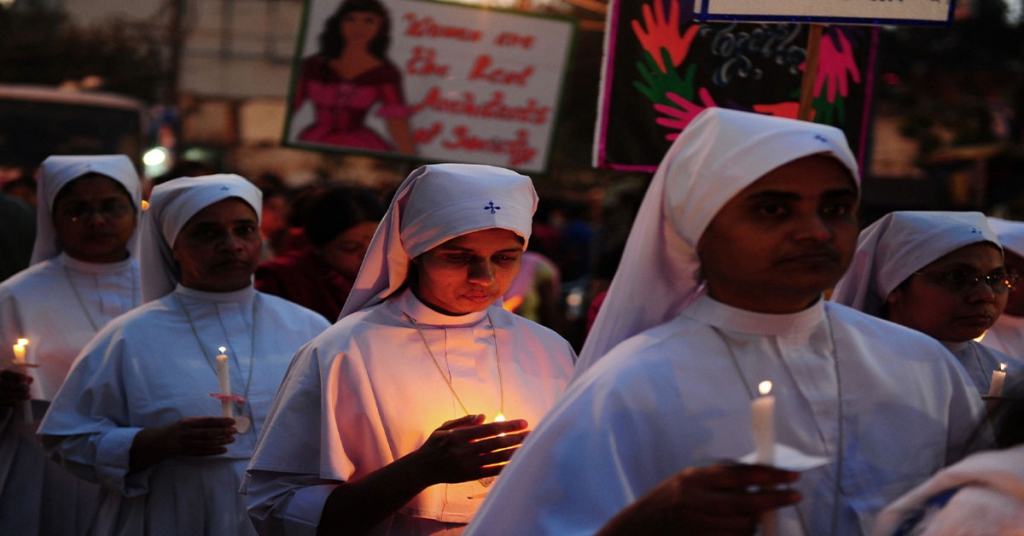
Over 350 verified incidents of hate crimes against Christians recorded EFIRLC Releases Annual Report on Hate Crimes against Christians in India in 2017
16, Feb 2018 | Press Release
The year 2017 has been one of the most traumatic for the Christian community in India since the mass targeted violence of the Kandhamal pogrom in 2007 and 2008. The Religious Liberty Commission of the Evangelical Fellowship of India (EFIRLC) documented at least 351 cases of violence in 2017, by no means an exhaustive compilation as it is based on voluntary reporting and civil society investigations. Most cases go unreported either because the victim is terrified or the police, especially in the northern states, just turn a blind eye and refuse to record the mandatory First Information Report (FIR). The EFI Annual Persecution Report 2017 may be read here.
The Indian Government admitted in Parliament that “communal violence”, the term used to define clashes between religious groups, increased 28% over three years to 2017. No disaggregated data is available, and the criminal justice system at the village and small towns level routinely ignores or violates provisions in the law. This is deeply disconcerting, and the EFIRLC calls upon the government to ensure that the Constitutional provisions for religious freedom, right to life and freedom are available to the poorest person in the most remote village.
The EFIRLC focuses on the targeting of Christians, but is alive to the persecution of, and pressure on, other religious minorities, caste discrimination against Dalits, and the situation of women in general and when they are trapped during religious or other group violence. It is therefore also deeply concerned at the many men, Muslims and Dalits, who have been lynched in the guise of punishing them for trafficking in cattle. EFIRLC has also been part of civil society initiatives, fact finding committees, and peace initiatives wherever it could. It recognises that issues of cow, caste and attempts to force Hindu religious codes on schools also impact the Christian community.
An analysis of the 2017 data shows Tamil Nadu emerge as the most hostile state where Christian are concerned, with 52 cases. Uttar Pradesh with 50, is a close second, and Chhattisgarh, 43, Madhya Pradesh, 36, Maharashtra, 38, are bunched together. The National Capital of Delhi, its police controlled by the national government, recorded 6 cases. Barring Tamil Nadu, the other states are either ruled by the BJP directly or in collation with other parties, and the Sangh cadres have free hand with the police and administration either looking the other way, or complicit. The Tamil Nadu violence has a disturbing overlay of caste discrimination, and the victims largely come from the so called lower castes in villages where the dominant groups object to prayer houses and even the entry of missionaries. The political instability in the state in the last one year has aggravated the situation.
The violence is evenly spread across the months of the year, though the prayerful period of Lent and Christmas which involves larger participation of people, also see a bigger targeting of Christians. April saw 54 cases and Christmas month, 40.
On the release of the report, Rev. Vijayesh Lal, General Secretary of Evangelical Fellowship of India and National Director for the Religious Liberty Commission of EFI, said, “It is distressing to see even private worship being attacked by Hindu right-wing activists violating the privacy and sanctity of an individual or a family and trampling upon their constitutional rights. The instances of attacks on Churches on Sundays and other important days of worship such as Palm Sunday, Good Friday, Easter and Christmas have increased. It is noted with much sadness that the law enforcement agencies are increasingly being used by non-state actors to stop and disrupt worship in Churches and in homes especially in Tamil Nadu and Uttar Pradesh. Christian children going to attend Bible camps with their parents permission, being taken into custody and detained for days on suspicion of conversion is bizarre and unheard of. Also worrisome is the attitude shown by some state governments and their heads who use public money to denounce Christianity publically. This must stop, and the various state governments and the union government, must move beyond mere lip service and uphold fundamental rights especially the right to Freedom of Religion or Belief, through concrete action and enforcement of law, without partiality.”
((This is a press release from EFILRC.))
(Feature Image: Indian Christians and social activists at a peace-rally and protest against the rape of a nun in Allahabad on March 16, 2015. AFP PHOTO/ SANJAY KANOJIASanjay Kanojia/AFP/Getty Images)










